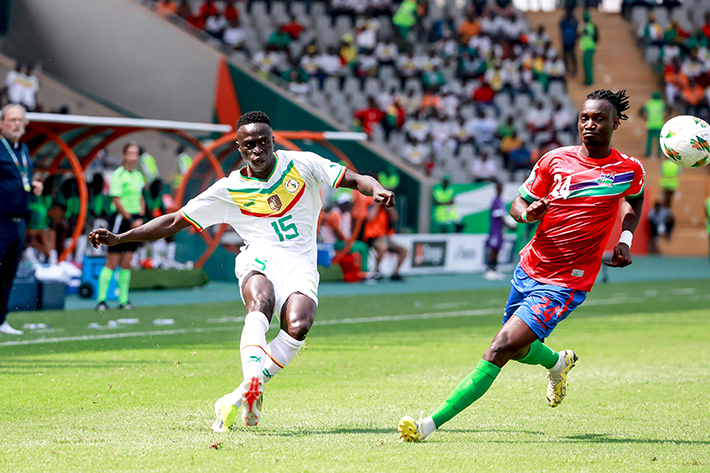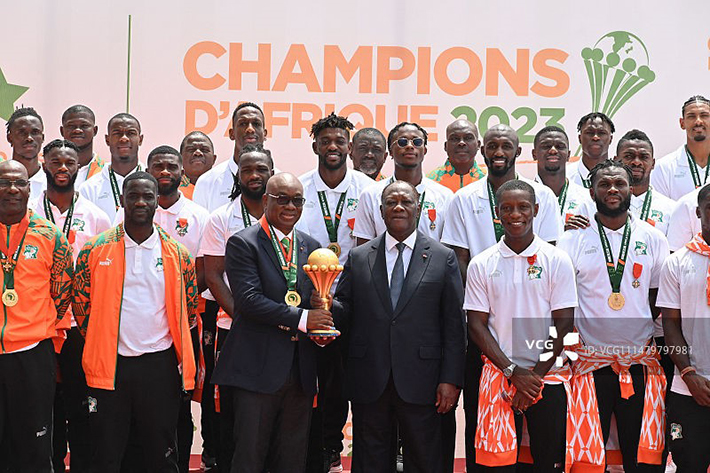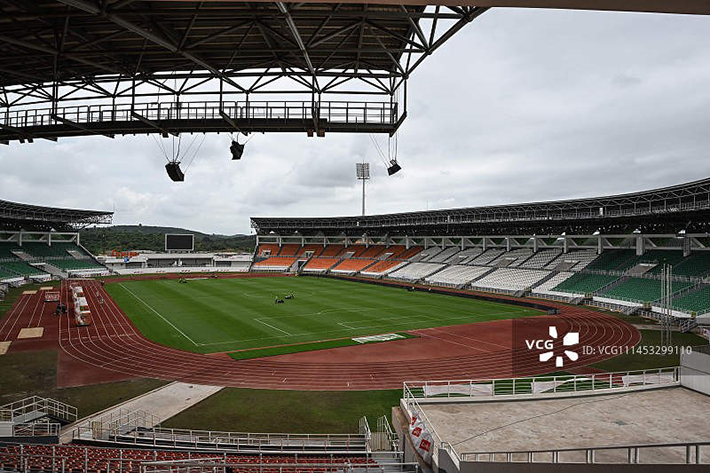|
||||||||||
| Home Nation World Business Opinion Lifestyle ChinAfrica Multimedia Columnists Documents Special Reports |
|
||||||||||
| Home Nation World Business Opinion Lifestyle ChinAfrica Multimedia Columnists Documents Special Reports |
| ChinAfrica |
| Echoes From Cote d’Ivoire |
| A look back at the upsets and unexpected turnarounds at the 2023 Africa Cup of Nations |
| By Eric Vincint Fomo | VOL. 16 March 2024 ·2024-03-25 |

Senegal-Gambia match in progress (COURTESY)
Cote d’Ivoire brilliantly orchestrated and won the 34th edition of the Africa Cup of Nations (CAN), held from 13 January to 11 February 2024, demonstrating its excellence in sports, security and modernisation. Sporting challenges were at the heart of the event, with 24 passionately competitive teams divided into six groups, offering intensely contested matches to an enthusiastic audience. These encounters highlighted the balance of footballing power between nations, and unexpected turnarounds defying predictions of bookmakers and football pundits.
From the time of kick-off on 13 January, Cote d’Ivoire displayed its ambition with a convincing 2-0 victory against Guinea-Bissau. However, being drawn in a tough group, the host country faced challenges, suffering a defeat against Nigeria (0-1) and a heavy setback against Equatorial Guinea (0-4). These two teams qualified for the next stage of the competition with seven points each, leaving Guinea-Bissau with no points.
Gambia is another team that, despite attractive play, left without a victory, having been defeated by Senegal, Guinea and Cameroon in its group. Senegal, the defending champion, had an impeccable run in Group C, finishing on top with nine points, closely followed by Guinea and Cameroon, both accumulating four points. Cameroon notably distinguished itself by securing a tight 3-2 victory against Gambia. Morocco continued its positive momentum from the last FIFA World Cup, making an impression at the beginning of the tournament.
Tough contest
However, the competition was also marked by disappointments, notably for Algeria, Tunisia and Ghana, who were eliminated prematurely. In contrast, Mauritania and Namibia surprised spectators by qualifying for the second round of a CAN for the first time. The host country emerged as the best third-placed team. Defeated in the group stage by Nigeria (0-1), Cote d’Ivoire got its revenge at the right moment, winning the final by beating the Super Eagles (2-1). That was a happy ending for a team that changed its coach due to poor results. The initial coach, Jean-Louis Gasset, handed over his position to his assistant coach, Emerse Faé. The latter instilled a fighting spirit in the Ivorian team, which defeated the Senegalese titleholders in the quarterfinals after a balanced match (1-1) and a penalty shootout (5-4). Cote d’Ivoire then overcame Mali (2-1) in the quarterfinals (after extra time) and the Democratic Republic of the Congo in the semifinals (1-0), before securing its miracle in the final against Nigeria.
This edition of CAN also highlighted or confirmed the talent of several African players, whose performances are regularly watched by international clubs. Emilio Nsue, forward and captain of Equatorial Guinea, was particularly remarkable, surpassing eminent players like African Ballon d’Or winner Victor Oshimen and his illustrious predecessor Sadio Mané with his skill in the penalty area. Angolan forward Gelson Dala also shone with his precision in front of goal and his ball control, illustrating his team’s collective strength, as did the Democratic Republic of the Congo. South African goalkeeper Ronwen Williams showcased his reflexes to thwart opponents’ attacks.
Egypt, the most successful nation in the history of CAN, had to cope with the absence of its star Mohamed Salah. However, Mostapha Mohamed’s performance was a positive point, although it was not enough to avoid setbacks. Equatorial Guinea’s goalkeeper Jesus Owono also stood out, refreshing memories of great African goalkeepers with his decisive interventions.

The Cote d’Ivoire national team is honoured by President Alassane Ouattara after their victory at the 34th edition of CAN on February (VCG)
Enhanced security
CAN took place in an environment marked by significant security challenges. Authorities had to manage not only security instability in neighbouring countries and the region but also internal challenges such as traffic congestion, terrorist risk and unplanned gatherings. To address these challenges effectively, close collaboration between the Ministry of Interior and Security and the Ministry of Defence was essential, resulting in the mobilisation of nearly 20,000 members of defence and security forces. These forces were deployed not only in the five cities hosting the tournament but also in other major cities across the country.
The Director-General of the Ivorian police, acting as the president of the Security Commission of the CAN Organising Committee, articulated security issues around several main areas: protecting individuals and property, managing traffic to avoid significant congestion observed during previous national team matches, providing safety to visitors to Cote d’Ivoire, and eliminating terrorist threats.
To address these challenges effectively, authorities also integrated digital solutions such as the use of surveillance cameras to enhance prevention and security during the event.

The Alassane Ouattara Olympic Stadium, built by China, is one of the five stadiums hosting CAN 2023 (VCG)
Modernisation and Chinese participation
The introduction of VAR (Video Assistant Referee) marks a modern turning point in camera usage, significantly improving the level of African refereeing. This innovation was widely praised for contributing to a fairer playing environment.
Spectators remained responsible and put their love for the game above the love for their team. The joint efforts of the Organising Committee and the Ivorian government provided remarkable logistical facilities, enabling teams and players to move around easily. This organisation allowed fans from various backgrounds to blend sports, tourism and business in an enriching experience.
Undoubtedly, one of the highlights of this competition was the quality of the stadiums, three out of five bearing Chinese signatures. The Alassane Ouattara Olympic Stadium, named after the current president of Cote d’Ivoire is a good example. Built by China in Abidjan, this architectural gem, also known as Ebimpé Olympic Stadium, has a capacity of 60,000 seats. Located in Ebimpé, in the northern suburb of Abidjan, it covers an area of 20 hectares and played a central role in hosting the opening and closing ceremonies of CAN 2023.
Built with a budget of 50 billion CFA francs ($82 million), its construction started in 2016 and was completed in 2020, specifically planned for CAN. Its modern design, inspired by a bird’s nest, is the work of the Beijing Institute of Architectural Design and was built by Beijing Construction Engineering Group, reflecting Chinese expertise not only in construction but also in financing large-scale projects.
In addition to the Ebimpé stadium, China also financed and built the Laurent Pokou Stadium in San Pedro in the southwest of the country, and was the main contractor for the Amadou Gon Coulibaly Stadium in Korhogo in the north.
These buildings illustrate China’s significant impact on the success of the 2023 CAN, which not only attracted international attention but also continues to draw admiration.
|
||||||
| About Us | Contact Us | Advertise with Us | Subscribe |
| Copyright Beijing Review All rights reserved 京ICP备08005356号-5 京公网安备110102005860号 |